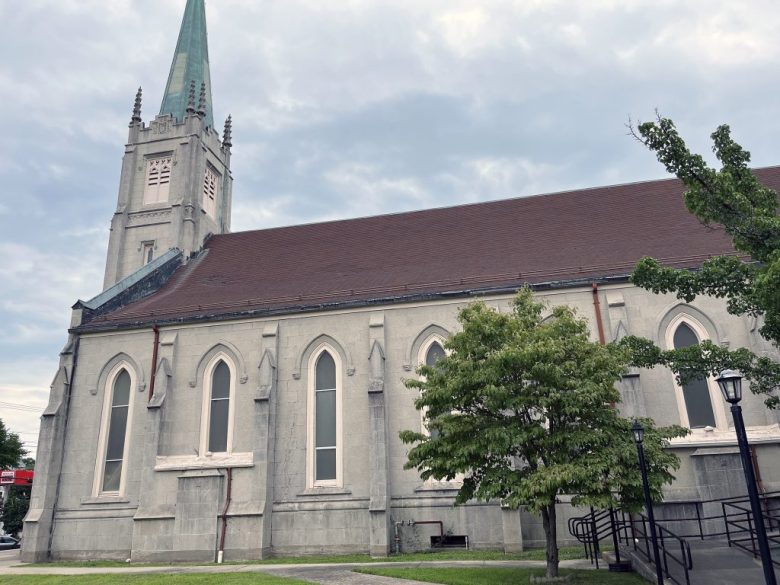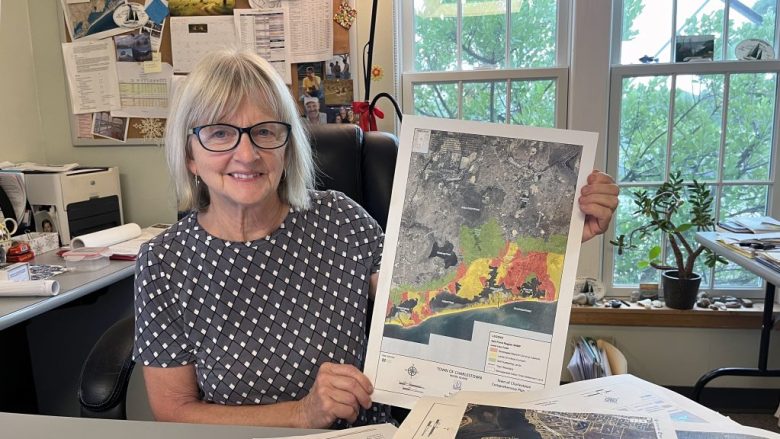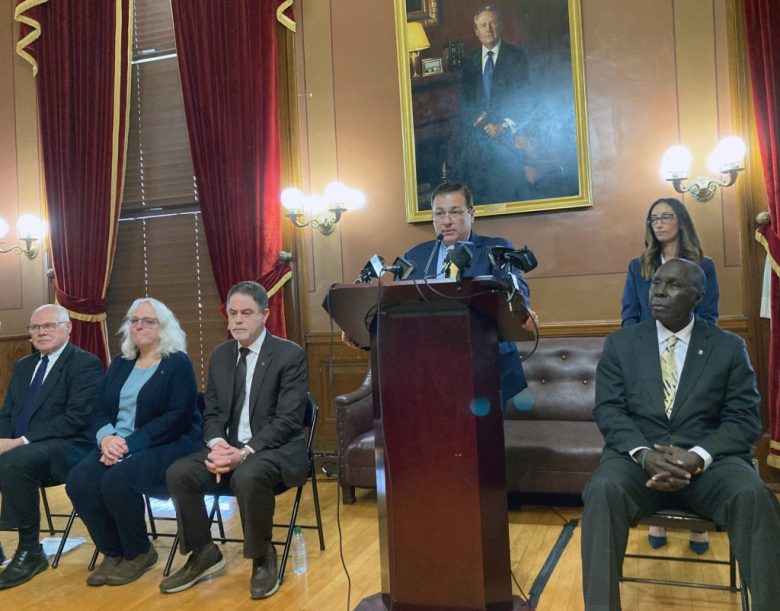Standing on Broad Street in Cumberland, Jennifer Hawkins looks up at the former St. Patrick’s Church. Hawkins leads the nonprofit developer ONE Neighborhood Builders, which is renovating the vacant church building and turning it into housing.
ONE Neighborhood Builders originally planned to build 44 low- and moderate-income apartments, but that number has increased thanks to a state law that took effect at the start of this year that lowered the number of parking spaces required for a project of this size.
Plans for the development, known as Steeple and Stone, initially called for 69 parking spaces — about 1.5 for each housing unit. Now, Hawkins said, “we’ll be able to have one-for-one parking. So we’ll be able to use this space more efficiently. Less paving and parking, and more housing.”
Hawkins now expects to be able to fit as many as 54 apartments on the site.
This story is part of our series Zoned Out: How local zoning hurts efforts to solve Rhode Island’s decades-long housing shortage. Click here to see more stories from this series.
Adding as many as 10 units to a single apartment building is not going to make a big dent in Rhode Island’s housing crisis. But Hawkins said this vacant-church-to-housing project shows how changes to zoning laws are an important part of the state’s response.
“Any time that we can increase the number of units on a site, we really should be doing it,” Hawkins said. “We should maximize density wherever possible. And one of the greatest barriers to maximizing density are the parking requirements.”
 ONE Neighborhood Builders plans to renovate the former St. Patrick’s Church in Cumberland and turn it into housing. Credit: Ian Donnis / The Public’s Radio
ONE Neighborhood Builders plans to renovate the former St. Patrick’s Church in Cumberland and turn it into housing. Credit: Ian Donnis / The Public’s Radio
Generally, cities and towns plan their space using their own zoning regulations. But that gives local Zoning Boards, Planning Boards and Town Councils the power to block building projects that state leaders say we sorely need.
In response, lawmakers have recently passed state laws that allow certain housing projects to get around some local zoning statutes. For instance, the 2023 law that cuts the required parking for the Steeple and Stone development reduces the ratio of parking spaces needed for projects that adapt former commercial spaces for housing, superseding the relevant zoning codes.
But as Rhode Island tries to accelerate progress in taming its housing crisis, zoning changes remain a flashpoint for conflict.
Jane Weidman, the town planner in Charlestown and legislative liaison for the Rhode Island chapter of the American Planning Association, said “there’s a lot of resentment” between local planners and state officials.
“It’s been an adversarial position instead of a collaborative position,” Weidman said during an interview at Town Hall. “There’s this idea up at the legislature that things have to come down from the top: ‘We need state mandates.’ There’s the whole issue of overriding local land use control, which is, I think, where a lot of the tension is.”
 Charlestown Town Planner Jane Weidman displays a map of development around the town’s salt ponds. Credit: Ian Donnis / The Public’s Radio
Charlestown Town Planner Jane Weidman displays a map of development around the town’s salt ponds. Credit: Ian Donnis / The Public’s Radio
For example, a new state law on accessory dwelling units (ADU) — small, self-contained residential units added to an existing home, sometimes called granny flats — allows property owners to create ADUs regardless of local zoning restrictions.
The measure was a top priority for House Speaker Joe Shekarchi and Gov. Dan McKee signed it into law last week after years of political battle.
Weidman said the new law enables development by right of ADUs in homes near Charlestown’s environmentally sensitive salt ponds, which the state Coastal Resources Management Council, she said, rates as already beyond their capacity to safely tolerate wells and septic systems. She remains unhappy that an effort to carve out these areas in the legislation was rejected.
“There is actually, I think, a fine line between where you put your state mandates in, which have the same impact across the state without considering the particular characteristics of the community, and then letting the communities figure it out for themselves,” Weidman said.
Letting communities determine housing policies for themselves is part of why Rhode Island has lagged the nation in housing starts for decades.
The resulting gap between supply and demand pushed the median home price in the state to $495,000 in July, as reported by the Rhode Island Association of Realtors, which is a 12.5% increase from a year earlier. The price is even higher in Charlestown, a desirable coastal community, where homes routinely sell for an average of roughly $700,000.
The continued upward march in home prices is one of the numbers that has spurred Rhode Island House Speaker Joe Shekarchi to make encouraging building one his top priorities at the statehouse.
“Doing nothing got us in this mess,” Shekarchi said. “Doing nothing is not going to get us out.”
 RI House Speaker Joe Shekarchi announces his support for a package of housing bills in March 2023. Credit: Ian Donnis / The Public’s Radio
RI House Speaker Joe Shekarchi announces his support for a package of housing bills in March 2023. Credit: Ian Donnis / The Public’s Radio
Shekarchi said making progress on housing affordability requires moving ahead with a variety of efforts and is crucial for the state’s economic growth. Shekarchi says lawmakers in Providence have taken a collaborative approach and he’s irritated with the planners and towns that have pushed back against his housing priorities.
“I made the mistake, or at least I made the misconception, that people showed up at the table to help. But unfortunately they didn’t,” Shekarchi said. “They showed up at the table to find out what was going on and then sound the alarm in a false way to try to gin up opposition to it.”
The speaker said he believes some opponents don’t understand the need for so-called workforce housing and have exaggerated the negative effect of the ADU bill and other some legislative measures.
Shekarchi, a land-use lawyer in his private practice, says that while he has seen progress in increasing homebuilding — and the number of housing starts has started to tick up a bit in Rhode Island, according to U.S. Census data — he doesn’t think the state can make big inroads in the housing crisis without major changes to zoning. He said he sees state mandates as a “last resort,” but he made clear he’s leaving the door open.
“I really don’t see any changes at all coming from the local level,” Shekarchi said. “All the changes you see are being spearheaded by the General Assembly.”
One change spearheaded by the powerful speaker — to allow housing development by right in commercial zones — ran into broad opposition and died in the most recent legislative session. Shekarchi attributes this to opposition from planners.
Back in Charlestown, Town Planner Jane Weidman said the bill attracted opposition because of a belief that it would hurt businesses by diluting commercial districts.
Weidman said she sees a need for more flexibility in zoning, although she says it serves an important purpose.
“There was a quote in the paper — a legislator called land-use laws that interfere with additional housing ‘accumulated crap, administrative sloth and detritus,’” Weidman said. “Well, you know, if it’s your neighborhood and you sort of rely on some sort of zoning structure to protect you, you might not consider that accumulated crap.”
In Charlestown, Weidman said local officials plan to conduct a study this fall looking at how the town’s mill villages and some commercial areas may be able to accommodate more density in housing.
“I think the planners, and the South County planners in particular, take the issue very seriously,” Weidman said. “It’s just, how do you get there? I think that’s where a lot of the pushback comes from some of the rural and suburban communities.”
Related
Source link : http://www.bing.com/news/apiclick.aspx?ref=FexRss&aid=&tid=66d7378d441b484b81a31502f92488e4&url=https%3A%2F%2Fthepublicsradio.org%2Fhousing%2Fas-state-lawmakers-look-to-boost-housing-zoning-remains-a-pitched-political-battle-in-rhode-island%2F&c=5011658271636297460&mkt=en-us
Author :
Publish date : 2024-09-02 13:00:00
Copyright for syndicated content belongs to the linked Source.
